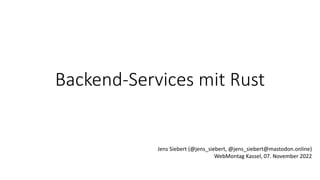
Backend-Services mit Rust
- 1. Backend-Services mit Rust Jens Siebert (@jens_siebert, @jens_siebert@mastodon.online) WebMontag Kassel, 07. November 2022
- 2. Über mich • Senior Software Developer bei doks.innovation in Kassel • Drohnen-Steuerung, Computer Vision, Architektur • Maker, 3D-Drucker, Nerd
- 3. Quo vadis, Backend-Entwicklung? Interpretierte Sprachen: • Java/JVM-basierte Sprachen: Spring, Micronaut, MicroProfile • Javascript/Typescript: Node.js, Deno, Express • Python: Django, Flask Kompilierte Sprachen: • Go: Kite, go-kit, go-micro • Rust: actix-web, rocket, tide, warp, axum
- 4. Quo vadis, Backend-Entwicklung? Interpretierte Sprachen: • Einfach zu lernen • Sicherheit durch automatische Speicherverwaltung • Garbage Collection • Langsamer Start-up/Just-in-Time Kompilierung Go: • Einfach zu lernen • Sicherheit durch automatische Speicherverwaltung • Garbage Collection • Schneller Start-up/Ahead-of-Time Kompilierung
- 5. Und Rust? Rust: • Nicht ganz so einfach zu lernen • Sicherheit durch automatische Speicherverwaltung • Garbage Collection • Schneller Start-up/Ahead-of-Time Kompilierung
- 6. Discord „Read States“ Service https://discord.com/blog/why-discord-is-switching-from-go-to-rust
- 7. Discord „Read States“ Service https://discord.com/blog/why-discord-is-switching-from-go-to-rust
- 8. Discord „Read States“ Service https://discord.com/blog/why-discord-is-switching-from-go-to-rust
- 9. Rust vs. Go? Rust AND Go! For most companies and users, Go is the right default option. Its performance is strong, Go is easy to adopt, and Go’s highly modular nature makes it particularly good for situations where requirements are changing or evolving. As your product matures, and requirements stabilize, there may be opportunities to have large wins from marginal increases in performance. In these cases, using Rust to maximize performance may well be worth the initial investment. https://thenewstack.io/rust-vs-go-why-theyre-better-together
- 10. Web Frameworks für Rust • actix-web (https://actix.rs) • rocket (https://rocket.rs) • tide (https://github.com/http-rs/tide) • warp (https://github.com/seanmonstar/warp) • axum (https://github.com/tokio-rs/axum) Auswahlhilfen: https://www.lpalmieri.com/posts/2020-07-04-choosing-a-rust-web-framework-2020-edition/ https://github.com/flosse/rust-web-framework-comparison
- 11. actix-web Architektur actix-web Client tokio Operating System High Performance Asynchronous IO
- 12. actix-web Features • Vollständig asynchron • HTTP/1.x und HTTP/2 • Request Routing • Middlewares (Logger, Session, CORS, etc.) • Transparente (De-)Kompression • WebSockets • Streams • Unterstützung für SSL/TLS • Unterstützung für Keep-Alive und Slow Requests • Statische Assets
- 13. Hello World! use actix_web::{web, App, HttpRequest, HttpServer, Responder}; async fn greet(req: HttpRequest) -> impl Responder { let name = req.match_info().get("name").unwrap_or("World"); format!("Hello {}!", &name) } #[actix_web::main] async fn main() -> std::io::Result<()> { HttpServer::new(|| { App::new() .route("/", web::get().to(greet)) .route("/{name}", web::get().to(greet)) }) .bind("127.0.0.1:8000")? .run() .await }
- 14. Main-Funktion #[actix_web::main] async fn main() -> std::io::Result<()> { HttpServer::new(|| { App::new() .route("/", web::get().to(greet)) .route("/{name}", web::get().to(greet)) }) .bind("127.0.0.1:8000")? .run() .await } Server-Initialisierung App-Initialisierung Route-Mapping Adress-Bindung Entry-Point
- 15. Handler-Funktion // Impliziter HttpResponse async fn greet(req: HttpRequest) -> impl Responder { let name = req.match_info().get("name").unwrap_or("World"); format!("Hello {}!", &name) } // Expliziter HttpResponse async fn greet(req: HttpRequest) -> Result<HttpResponse, Error> { let name = req.match_info().get("name").unwrap_or("World"); let body = format!("Hello {}!", &name); Ok(HttpResponse::Ok().body(body)) }
- 16. Datenbankzugriff mit Diesel • Object Relational Mapper und Query Builder für Rust • Fokus auf möglichst schlanke Abstraktionen • Hohe Performance • Unterstützte Datenbanken: • MySQL • PostgreSQL • SQLite • …
- 17. Datenbankzugriff mit Diesel -- Mapping #[derive(Debug, Clone, Serialize, Deserialize, Queryable, Insertable)] pub struct User { pub id: String, pub name: String }
- 18. Datenbankzugriff mit Diesel -- Verbindung #[actix_web::main] async fn main() -> std::io::Result<()> { let connspec = std::env::var("DATABASE_URL").expect("DATABASE_URL"); let manager = ConnectionManager::<SqliteConnection>::new(connspec); let pool = r2d2::Pool::builder() .build(manager) .expect("Failed to create pool."); HttpServer::new(move || { App::new() .data(pool.clone()) .service(get_user) .service(add_user) }) .bind("127.0.0.1:8000")? .run() .await }
- 19. Datenbankzugriff mit Diesel -- Insert-Handler #[post("/user")] async fn add_user(pool: web::Data<DbPool>, form: web::Json<NewUser>) -> Result<HttpResponse, Error> { let conn = pool.get().expect("couldn't get db connection from pool"); let user = web::block(move || insert_new_user(&form.name, &conn)) .await .map_err(|e| { eprintln!("{}", e); HttpResponse::InternalServerError().finish() })?; Ok(HttpResponse::Ok().json(user)) }
- 20. Datenbankzugriff mit Diesel -- Insert pub fn insert_new_user(nm: &str, conn: &SqliteConnection,) -> Result<User, diesel::result::Error> { use crate::schema::users::dsl::*; let new_user = User { id: Uuid::new_v4().to_string(), name: nm.to_owned() }; diesel::insert_into(users).values(&new_user).execute(conn)?; Ok(new_user) }
- 21. Fazit Rust als Basis für Backend-Services bietet: • Hohe Performance durch Ahead-of-Time Kompilierung, Zero Cost Abstractions • Sicheres Speichermanagement bereits während der Kompilierung • Sichere Nebenläufigkeit • Keine Einbrüche bei der Performance durch Garbage Collection • Komfortables Tooling, welches etablierten Sprachen und Frameworks in nichts nachsteht • Freundliche und hilfsbereite Community • Teilweise steile Lernkurve (aber es lohnt sich!)
- 22. Literatur
- 23. Vielen Dank! https://www.rust-lang.org/learn https://actix.rs/docs https://diesel.rs/guides Twitter: @jens_siebert Mastodon: @jens_siebert@mastodon.online
